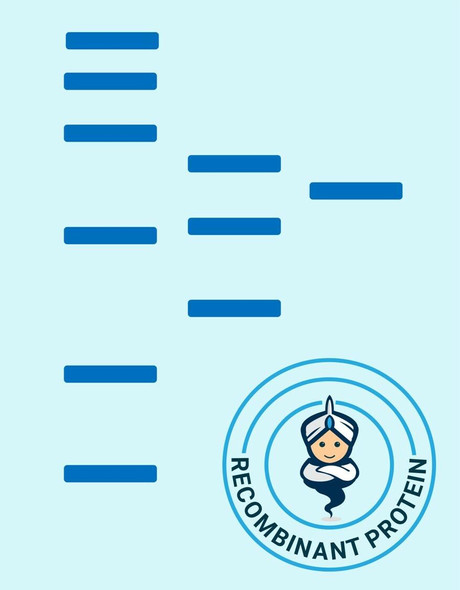Description
| Product Name: | Human SPG21 Recombinant Protein |
| Product Code: | RPPB4803 |
| Size: | 20µg |
| Species: | Human |
| Target: | SPG21 |
| Synonyms: | MAST, ACP33, GL010, BM-019, MASPARDIN, SPG21, Spastic paraplegia 21 autosomal recessive Mast syndrome protein, Acid cluster protein 33. |
| Source: | Escherichia Coli |
| Physical Appearance: | Sterile filtered colorless solution. |
| Formulation: | The SPG21 protein solution contains 20mM Tris-HCl, pH-8. |
| Stability: | Store at 4°C if entire vial will be used within 2-4 weeks. Store, frozen at -20°C for longer periods of time. For long term storage it is recommended to add a carrier protein (0.1% HSA or BSA). Avoid multiple freeze-thaw cycles. |
| Purity: | Greater than 95.0% as determined by SDS-PAGE. |
| Amino Acid Sequence: | MGSSHHHHHH SSGLVPRGSH MGEIKVSPDY NWFRGTVPLK KIIVDDDDSK IWSLYDAGPR SIRCPLIFLP PVSGTADVFF RQILALTGWG YRVIALQYPV YWDHLEFCDG FRKLLDHLQL DKVHLFGASL GGFLAQKFAE YTHKSPRVHS LILCNSFSDT SIFNQTWTAN SFWLMPAFML KKIVLGNFSS GPVDPMMADA IDFMVDRLES LGQSELASRL TLNCQNSYVE PHKIRDIPVT IMDVFDQSAL STEAKEEMYK LYPNARRAHL KTGGNFPYLC RSAEVNLYVQ IHLLQFHGTK YAAIDPSMVS AEELEVQKGS LGISQEEQ |
SPG21 binds to the hydrophobic C-terminal amino acids of CD4 which take part in suppression of CD-4 dependant T cell activation. The interaction with CD4 is mediated by the noncatalytic alpha/beta hydrolase fold domain. SPG21 adapts the stimulatory activity of CD4. SPG21 is broadly expressed in diverse tissues including heart, brain, placenta, lung, liver, skeletal muscle, kidney and pancreas. Mutations in SPG21 cause Mast syndrome, an autosomal-recessive complicated form of hereditary spastic paraplegia characterized by dementia, thin corpus callosum and white matter abnormalities.
SPG21 produced in E.Coli is a single, non-glycosylated polypeptide chain containing 328 amino acids (1-308 a.a.) and having a molecular mass of 94.4 kDa.SPG21 is expressed with a 20 amino acid His tag at N-Terminus and purified by proprietary chromatographic techniques.
| UniProt Protein Function: | SPG21: May play a role as a negative regulatory factor in CD4- dependent T-cell activation. Defects in SPG21 are the cause of spastic paraplegia autosomal recessive type 21 (SPG21); also known as Mast syndrome. Spastic paraplegia is a neurodegenerative disorder characterized by a slow, gradual, progressive weakness and spasticity of the lower limbs. Rate of progression and the severity of symptoms are quite variable. Initial symptoms may include difficulty with balance, weakness and stiffness in the legs, muscle spasms, and dragging the toes when walking. In some forms of the disorder, bladder symptoms (such as incontinence) may appear, or the weakness and stiffness may spread to other parts of the body. SPG21 is associated with dementia and other central nervous system abnormalities. Subtle childhood abnormalities may be present, but the main features develop in early adulthood. The disease is slowly progressive, and cerebellar and extrapyramidal signs are also found in patients with advanced disease. Patients have a thin corpus callosum and white-matter abnormalities. Belongs to the AB hydrolase superfamily. 2 isoforms of the human protein are produced by alternative splicing.Protein type: Unknown functionChromosomal Location of Human Ortholog: 15q22.31Cellular Component: nucleoplasm; trans-Golgi network transport vesicle; cytoplasm; endosome membrane; nucleus; cytosolMolecular Function: protein binding; CD4 receptor bindingBiological Process: antigen receptor-mediated signaling pathwayDisease: Mast Syndrome |
| UniProt Protein Details: | |
| NCBI Summary: | The protein encoded by this gene binds to the hydrophobic C-terminal amino acids of CD4 which are involved in repression of T cell activation. The interaction with CD4 is mediated by the noncatalytic alpha/beta hydrolase fold domain of this protein. It is thus proposed that this gene product modulates the stimulatory activity of CD4. Mutations in this gene are associated with autosomal recessive spastic paraplegia 21 (SPG21), also known as mast syndrome. Alternative splicing results in multiple transcript variants. [provided by RefSeq, Aug 2014] |
| UniProt Code: | Q9NZD8 |
| NCBI GenInfo Identifier: | 7706174 |
| NCBI Gene ID: | 51324 |
| NCBI Accession: | NP_057714.1 |
| UniProt Secondary Accession: | Q9NZD8,Q6ZMB6, B4DW44 |
| UniProt Related Accession: | Q9NZD8 |
| Molecular Weight: | 31,585 Da |
| NCBI Full Name: | maspardin isoform a |
| NCBI Synonym Full Names: | SPG21, maspardin |
| NCBI Official Symbol: | SPG21�� |
| NCBI Official Synonym Symbols: | MAST; ACP33; GL010; BM-019�� |
| NCBI Protein Information: | maspardin |
| UniProt Protein Name: | Maspardin |
| UniProt Synonym Protein Names: | Acid cluster protein 33; Spastic paraplegia 21 autosomal recessive Mast syndrome protein; Spastic paraplegia 21 protein |
| Protein Family: | Maspardin |
| UniProt Gene Name: | SPG21�� |
| UniProt Entry Name: | SPG21_HUMAN |






